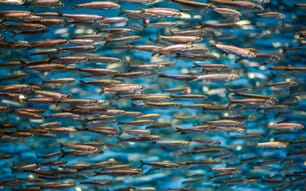Professor Satoh's research first began while he was studying the bioavailability of dietary trace elements in fishmeal.
"The more I studied fishmeal and nutrition, the more I began to realize the value in alternative feeds," he explained to me during a recent visit.
"For example, in fishmeal, dietary zinc availability and absorption are reduced in the presence of phosphorus, and other elements from fishmeal such as nitrogen and phosphorus are also causes of red tides and eutrophication. That's when I started thinking that a diet with little or no fishmeal would be more environmentally friendly."
Other factors have made the Professor's research all the more important. The global expansion in aquaculture has led to an increased demand for fishmeal and fish oil but at the same time, the landings of fish such as anchovy off countries like Peru, a major fishmeal supplier, have been declining.
With limited fishmeal supplies worldwide and dramatic increases in fishmeal prices, Professor Satoh soon realised the need to develop low- or non-fishmeal feed for marine cultured fish, and thanks to a joint collaboration with the Nagasaki Fisheries Research Station in southern Japan, began by formulating a diet for yellowtail and red sea bream.
"Once we'd come up with a suitable formulation, we started working with Nagasaki Fisheries Research Station to rear yellowtail and raised red sea bream here at the university," Satoh explained.
"We were particularly surprised by the results of the red sea bream as they eat anything, and they grew a lot bigger and faster than we were expecting on a diet with little to no fishmeal. I'm hopeful about selective breeding. I believe that one day, we'll be able to breed a particular kind of red sea bream that responds well to little or no fishmeal."
Professor Satoh's fish were given a variety of feeds from corn-based alternatives to soybean protein. Not only are these easy to obtain in Japan, but thanks to their abundance and relatively low cost, they are also considered the most interesting and promising of the plant proteins. However, the presence of phytic acid and other anti-nutritional factors leads to poor palatability and a deficiency in indispensable amino acids, most notably taurine, a derivative of sulfur-containing compounds such as methionine that plays important roles in digestion and neurotransmission. Taurine is contained in fishmeal but not in plant-based alternatives, and its synthetic ability is low in marine fish.
Professor Satoh found that yellowtail that were fed a fishmeal alternative stopped growing after 40 days as they were unable to convert amino acids such as methionine and cysteine into taurine.
"Taurine is indispensable," he explained. "For one thing, it makes the fish able to eat more, and improves weight gain and feed efficiency. Without it, fish tend to exhibit poor growth and green liver syndrome. In fact, yellowtail that were given a low fishmeal feed with methionine and lysine showed reduced growth performance, green liver syndrome and high mortality."
Professor Satoh then began investigating the extent to which the amount of fishmeal in feed could be lowered so that a taurine supplementation becomes necessary. In the case of yellowtail, he found that the fish can grow normally with 30 per cent fishmeal in their feed, but that a taurine supplement was required if the amount of fishmeal in the feed was 20 per cent. But the road to "vegetarian" fish is still a long one -- Professor Satoh also found that even if using soybean or corn protein, the yellowtail grew just as well if a byproduct derived from dried bonito manufacturing were added to their feed.
"Sometimes the fish wouldn't eat the soybean or plant-based feed we gave them, and even if they did they would just spit it out," he explained.
"So in order to trick them, as it were, we came up with the idea of using bonito peptides that make the feed taste like fish. However, feed like this can be difficult to digest compared to plant-based feed, so we added digestive enzymes. At the moment, results are good so we may be able to keep using this for a while. We're currently experimenting with all kinds of mixtures such as poultry meal, pork, chicken meal and feather meal."
The biggest challenge, according to Professor Satoh, was making sure the fish were eating what they were given. Despite the challenges, however, he believes that his research will have positive impacts on aquaculture and fisheries in Japan and the rest of the world.
"Fishmeal prices are rising, so an increasing number of companies are manufacturing fishmeal alternatives," he said. "Because fishmeal contains phosphorus, it can be a cause of eutrophication and red tides. Soybean, for example, is much more environmentally friendly. A lot of feed manufacturers still believe fishmeal is the best but because prices are rising they have no choice but to look into other alternatives. Japan's aquaculture still uses a lot of fishmeal but I believe that will change."
Although enquiries are coming in from countries such as Chile, as well as Japanese firms who are rearing fish abroad, Professor Satoh believes there is still a long way to go. In particular, he says, there is a huge need to increase the availability of plant-based feeds, and because these feeds are harder to digest compared to fishmeal, their quality must be good. Pre-treatment and enzyme supplementation will help to eliminate the effects of anti-nutritional factors and improve the utilization of dietary energy and amino acids, leading to improved fish performance.
In future, Professor Satoh will be investigating how to inactivate anti-nutritional substances in plant ingredients, improve the quality of fishmeal alternatives and increase the use of animal by-products. We'll be checking back to see how he fares.




